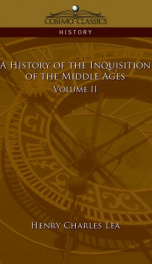a history of the inquisition of the middle ages volume 2

As civilization slowly advanced, as the midnight of the Dark Ages began to yield to the approaching dawn of modern ideas, as the hopelessness of humanity grew less abject, the Manichaean theory grew less attractive. The world was gradually awakening to new aims and new possibilities; it was outgrowing the dreary philosophy of pessimism, and was unconsciously preparing for the yet unknown future in which man was to regard Nature not as an enemy, but as a teacher. -from "Chapter IV: Italy" Considered America's first great scholar of the Middle Ages and a trailblazing proponent of utilizing primary sources when inquiring into the past, Henry Charles Lea gave us what is still a vital history of the centuries-long reign of terror known as the Inquisition. A passionate account of mass hysteria, its spiritual and intellectual roots, and its "inevitable" evolution, this is grimly fascinating and highly readable, an excellent investigation into one of the foundations of modern civilization the repercussions of which are still being felt today. Volume 2 of this 3-volume 1888 work examines the localized affects of the Inquisition in France, Spain, Italy, and Germany, including Inquisitorial frauds in which victims were "selected for spoilation on account of their wealth," the decadence of the Inquisitors, and assassinations, rebellions, and other intrigues.
Info about the book
Author:
Series:
Unknown
ISBN:
1478153865
Rating:
3/5 (3)Your rating:
0/5
Languge:
English
Users who have this book
Users who want this book
What readers are saying
What do you think? Write your own comment on this book!
write a commentif you like a history of the inquisition of the middle ages volume 2 try:
Other books by this author
Do you want to exchange books? It’s EASY!
Get registered and find other users who want to give their favourite books to good hands!


